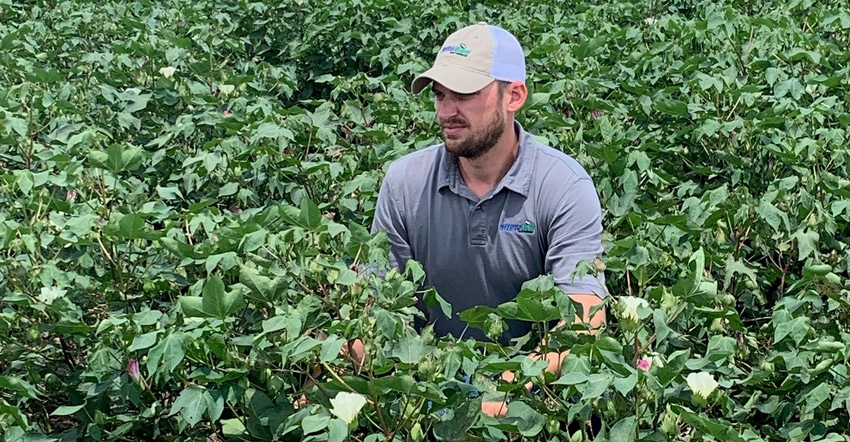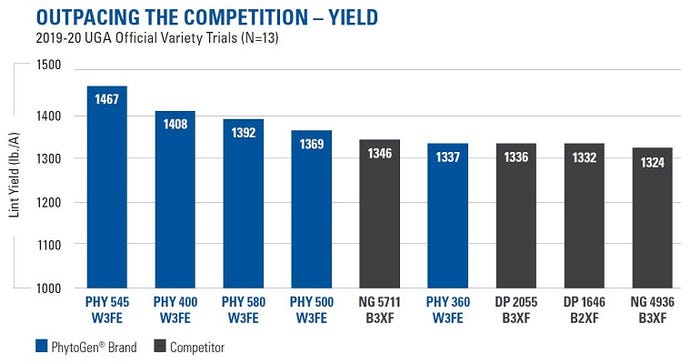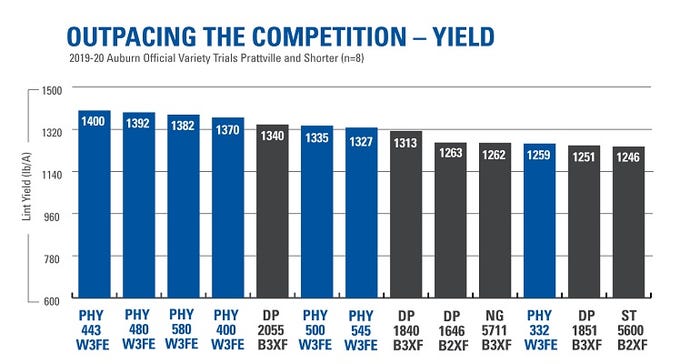April 15, 2021

Sponsored Content
As Southeast cotton producers make final variety decisions for the 2021 season, many have high hopes for cotton acres as yields trend upward with newer varieties.
Official Variety Trials in Georgia and Alabama from the last two years show newer varieties from PhytoGen cottonseed yielding higher than popular competitive varieties.
In a two-year average of University of Georgia Official Variety Trials (OVTs) from 2019 and 2020, the top four varieties from PhytoGen cottonseed yielded higher than many well-known competitors, with PhytoGen brand PHY 545 W3FE yielding higher than DP 1646 B2XF by 135 pounds.
PhytoGen Cotton Development Specialist Shawn Butler, Ph.D., conducts variety trials throughout Georgia and says these OVT results line up with the performance he saw in the field last season.
"These PhytoGen W3FE varieties bring a new value opportunity to cotton growers in the Southeast," Butler said. "They have excellent fiber quality, three-gene Bt, and yield protection traits such as resistance to root-knot nematodes, reniform nematodes and bacterial blight, all packaged in a wide range of maturities with consistent yield potential."

Protection against seasonal pests provides yield stability, which is one reason these newer PhytoGen W3FE varieties have performed consistently over several seasons.
"When you look at trial results across multiple locations from more than one season, you see the stability of variety performance in various conditions," Butler said. "Our customers are really excited about the potential of these varieties, and we're hoping 2021 will give us a chance to show what these varieties can really do."
Butler said PhytoGen brand PHY 360 W3FE, PHY 400 W3FE and PHY 443 W3FE performed well for Southeast producers who prefer mid-maturing varieties. Farmers in the lower Southeast who plant full-season varieties should consider PHY 500 W3FE, PHY 545 W3FE and PHY 580 W3FE.
In addition to the high-yield potential, PhytoGen Cotton Development Specialist Russell Nuti, Ph.D., said the Enlist cotton trait makes these varieties an excellent fit for those also growing peanuts. With PhytoGen W3FE varieties, farmers can control weeds using over-the-top applications of Enlist herbicides, which contain 2,4-D choline for excellent weed control and near-zero volatility.
"PhytoGen W3FE varieties and the Enlist weed control system are a natural fit for our area," Nuti said. "Producers no longer have to fear drift or sprayer contamination from 2,4-DB used in peanuts since PhytoGen W3FE varieties are not affected by off-target movement from peanut fields. PhytoGen W3FE varieties offer the complete package for the lower Southeast with the benefits of excellent yield potential, fiber quality and nematode resistance."
New variety catches eyes in Auburn OVTs
Nuti also pointed to the Auburn University OVTs from central Alabama as indicators of strong performance of newer PhytoGen W3FE varieties. PhytoGen brand PHY 443 W3FE led the pack for PhytoGen, averaging 1,400 pounds/A across eight trials from 2019-2020.
"PHY 443 W3FE looks very strong for Southeast cotton producers, and we're excited to see this variety across more farms in the 2021 season," Nuti said. "With its aggressive growth habit, mid-maturity and PhytoGen Breeding Traits package, this variety is particularly well suited for growers across Alabama, Georgia, Florida and into South Carolina."

PhytoGen brand PHY 443 W3FE is one of two PhytoGen brand varieties with built-in resistance to root-knot and reniform nematodes, a first for the cotton industry. This native resistance protects roots and plants for higher yield potential. Company trials from 2019 and 2020 also showed up to 90% reduction in reniform nematode soil populations after planting these varieties -- making fields more productive for future crops.1
Similarly, Auburn University trials from 2020 showed an 82% to 83% reduction in root-knot and reniform nematodes when planting PhytoGen W3FE varieties with resistance to these pests.2 Nuti said those same trials showed a significant increase in yield potential.
"In a 2020 Auburn trial, one of our reniform-resistant PhytoGen W3FE varieties produced twice the yield of the susceptible variety," Nuti said. "If your fields have high populations of root-knot or reniform nematodes, we highly recommend you plant a variety with these PhytoGen Breeding Traits."
For more information about PhytoGen cottonseed in the Southeast, growers can go to www.PhytoGenCottonseed.com.
1 2019 data came from 7 trial locations with up to 90 percent reniform nematode population reduction and a 68% average reduction across all plots. 2020 data came from 13 trial locations with up to 85 percent reniform nematode population reduction and a 67% reduction across all plots.
2 2020 Alabama Row Crops Short Course Video Series, Nematode Resistant Cotton Varieties. https://www.youtube.com/watch?v=DuQScyIUUrE
ª ¨ Enlist, Enlist One, PhytoGen, the PhytoGen logo and PhytoGen Breeding Traits are trademarks of Corteva Agriscience and its affiliated companies. Enlist Duo¨ and Enlist One¨ herbicides are not registered for sale or use in all states or counties. Contact your state pesticide regulatory agency to determine if a product is registered for sale or use in your area. Enlist Duo and Enlist One herbicides are the only 2,4-D products authorized for use with Enlistª crops. Consult Enlist herbicide labels for weed species controlled. Always read and follow label directions. © 2021 Corteva.
About the Author(s)
You May Also Like




